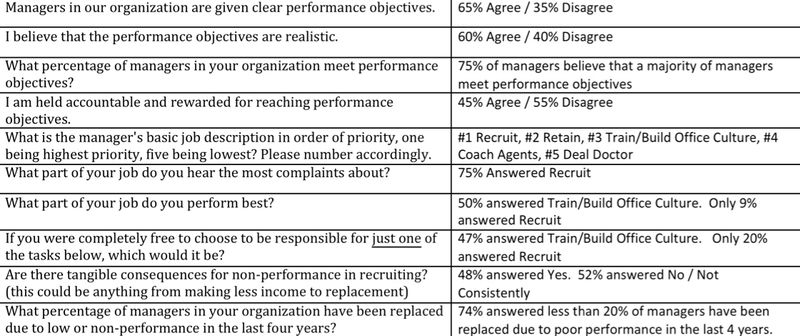As some of you might recall, we asked each of you to participate in a real estate manager survey back in September. The purpose of the survey was to help us (and, in turn, you) better understand the challenges of the real estate manager role.
This was an unusual survey in that a group of our readers actually helped design many of the questions. In designing the survey in this manner, we hoped to focus on the issues that were of the highest interest and concern to the group.
The anxieties that seemed to rise to the top in this process centered on the appropriateness of the many “hats” a first-level manager is required to wear in today’s real estate company.
More specifically…What are the hats that managers typically wear? How does a manager balance these different roles? and, How is success measured and accountability maintained?
In the end, there were ten questions selected for the survey. These questions are listed on the left side of the chart below. On the right side of the chart, we’ve summarized the data that was collected in the responses.
This is not intended to be a vision test. To view a more readable version of the chart, click on it and a new window will open and display a much larger version (if you’re an email reader, clicking on the chart will take you to WorkPuzzle where you can click the chart again and get the larger version).
Take a few minutes to digest this information. Is there anything that surprises you? Do you see any inconsistencies in the responses that you feel are significant? Do you notice similarities between what you’re experiencing in your company and what your peers in other companies are reporting? Do you see problems that seem to characterize the manager position? If so, what are they, and why are they systemic?
Next week, I’ll provide some thoughts on the survey and make some suggestions regarding how you can use this data to make changes and improve your performance. In the meantime, record (click the comment link in web version) or email your comments (reply to your WorkPuzzle email) to me. I’d love to hear your thoughts, and it will also help me focus on the issues that you find most interesting.
Editor's Note: This article was written by Ben Hess. Ben is the Founding Partner and Managing Director of Tidemark, Inc. and a regular contributor to WorkPuzzle. Comments or questions are welcome. If you're an email subscriber, reply to this WorkPuzzle email. If you read the blog directly from the web, you can click the "comments" link below.












